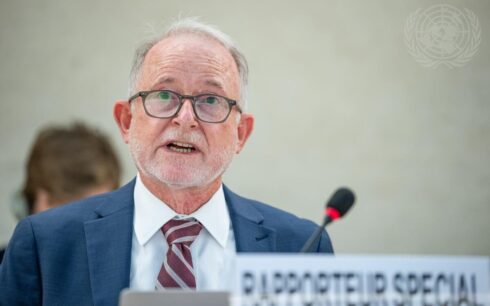GENEVA — A United Nations report presented to the Human Rights Council warns that human rights conditions in Afghanistan have deteriorated further, with women, minorities, and civil society facing extreme repression under Taliban rule.
According to Richard Bennett, the U.N. Special Rapporteur on Afghanistan, the Taliban’s gender-based oppression has become more systematic and institutionalized. The report states: “The Taliban have continued to implement their deeply misogynistic system of oppression of and discrimination against women and girls that is unparalleled in any other country.”
The report highlights the Taliban’s continued restrictions on women, noting that their policies may constitute crimes against humanity, specifically gender persecution. The International Criminal Court (ICC) has already requested arrest warrants for Taliban leaders on this basis.
“The law on the promotion of virtue and the prevention of vice sets out wide-ranging restrictions affecting almost every facet of life for women and girls,” the report states. It details new bans, including prohibitions on women singing or speaking outside their homes and the requirement for a male guardian (mahram) for all travel, regardless of distance.
In December 2024, the Taliban banned women from private medical education, affecting 35,000 female students. The report warns: “The directive marked a further unjustifiable restriction on women’s and girls’ rights to education and healthcare and on women’s right to work.”
It also highlights the mental health crisis among Afghan women, with increasing reports of stress, anxiety, depression, and suicidal ideation. One Afghan woman told the Special Rapporteur: “I want to go to school, to laugh with my friends and to be someone who can make a difference. But the restrictions make me feel trapped.”
Crackdown on free speech
The Taliban have intensified their suppression of dissent, targeting journalists, activists, and academics. The report states: “Afghans still in the country who oppose the Taliban live in fear, with many resorting to self-censorship, moving locations regularly or fleeing the country.”
At least 10 media outlets were shut down in 2024, while over 300 had already closed in the first six months of Taliban rule. The U.N. notes: “The combination of violence, censorship, and the closure of media companies has forced Afghanistan-based media outlets and their personnel to comply strictly with Taliban requirements.”
Afghans have also reported increased Taliban surveillance, with informants monitoring social media and personal conversations. The report states: “Many have reported that they take digital protection measures, noting that the Taliban might search mobile phones at checkpoints.”
Corporal punishment
Between July and December 2024, the Taliban carried out 311 public floggings, a 22% increase compared to the first half of the year. The report states: “The vast majority received more than 30 lashes in addition to prison sentences.”
Additionally, the Taliban executed prisoners in public, including a November 2024 execution in a stadium in Paktiya Province. The report condemns these actions, warning: “Public executions violate the right to life and the prohibition of torture and other cruel, inhuman or degrading treatment or punishment.”
The ICC has now requested additional arrest warrants for Taliban leaders involved in these punishments, stating that their judicial practices violate international human rights law.
Religious and ethnic minorities under threat
The report highlights widespread persecution of religious and ethnic minorities, particularly Hazaras, Shia Muslims, and Sufis. It notes that ISIS-K (Islamic State-Khorasan) has carried out targeted killings, while the Taliban have failed to protect communities at risk.
“On 12 September 2024, armed men shot and killed 14 male Shia Hazara civilians in Daykundi Province,” the report states. In November, 10 Sufi worshippers were murdered in Baghlan Province. While the Taliban condemned the attacks, “they seem to have avoided highlighting the minority status of the victims.”
The report also documents forced evictions targeting ethnic minorities, particularly in northern Afghanistan. It warns: “Many Hazaras, Uzbeks, and Turkmen have been forcibly displaced by groups aligned with the Taliban, often through violence and intimidation.”
Severe economic and humanitarian crisis
Beyond human rights violations, Afghanistan is experiencing one of the world’s worst humanitarian crises. The report states: “Nearly 15 million people suffer from acute food insecurity, including 3.1 million in emergency conditions (IPC Phase 4).”
Despite this, funding for humanitarian aid remains dangerously low. The report warns: “Only 0.9% of the $1.09 billion needed for the Afghanistan Humanitarian Fund has been secured.” This shortfall threatens life-saving assistance for millions.
The healthcare system is collapsing, with 288 medical facilities shutting down in 2024, affecting 3.3 million people. Afghanistan also saw 17 polio cases in 2024, nearly triple the six cases from the previous year, following Taliban-imposed restrictions on house-to-house polio vaccinations.
The report emphasizes: “Women and girls face particular barriers owing to restrictions that prevent them from earning income, gaining access to aid and markets, and securing food.”
International Response and Calls for Accountability
Bennett urges the international community to take stronger action, calling for recognition of gender apartheid as a crime against humanity, increased protection for Afghan refugees, including nearly 6 million Afghans living abroad, and more humanitarian funding, particularly for women and children.
The ICC has already taken action, seeking arrest warrants for Taliban Supreme Leader Haibatullah Akhundzada and Chief Justice Abdul Hakim Haqqani for their role in gender persecution. The U.N. report notes: “This marks an important beginning in holding to account those who have contributed to the suffering and injustice faced by the people of Afghanistan.”
Additionally, some governments are exploring legal action against the Taliban under the Convention on the Elimination of All Forms of Discrimination Against Women, which could lead to a case at the International Court of Justice.
Despite these warnings, the report expresses concern that some countries are moving toward normalizing engagement with the Taliban. It states: “The international community seems to be inching towards the normalization and de facto recognition of the Taliban regime.” Afghan activists warn that this risks legitimizing Taliban rule while ignoring the suffering of millions.
The report concludes: “The continued neglect of the Afghanistan human rights crisis is a failure that will reverberate through the lives of the country’s citizens, particularly women and girls, and across borders.”
It urges the international community to adopt a rights-centered approach to engaging with the Taliban, ensure that normalization is based on measurable improvements in human rights, and support accountability efforts, including ICC prosecutions and transitional justice mechanisms.
The report warns that unless urgent action is taken, Afghanistan’s humanitarian crisis will deepen, human rights abuses will worsen, and millions of lives will remain at risk.





